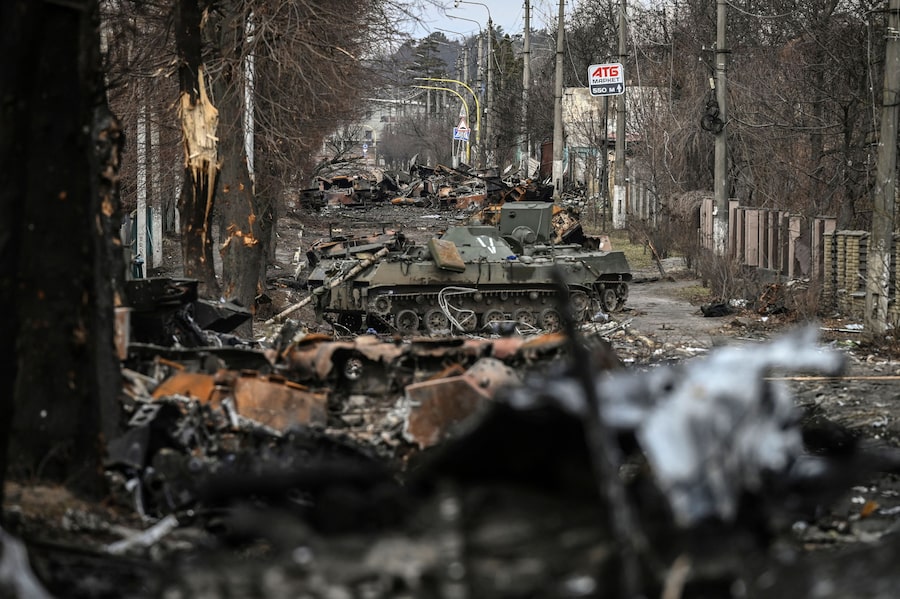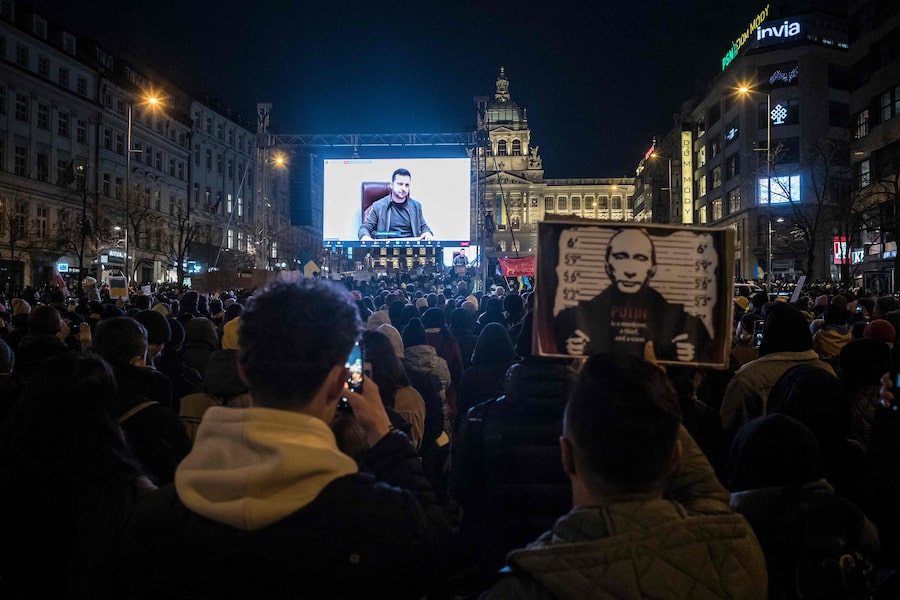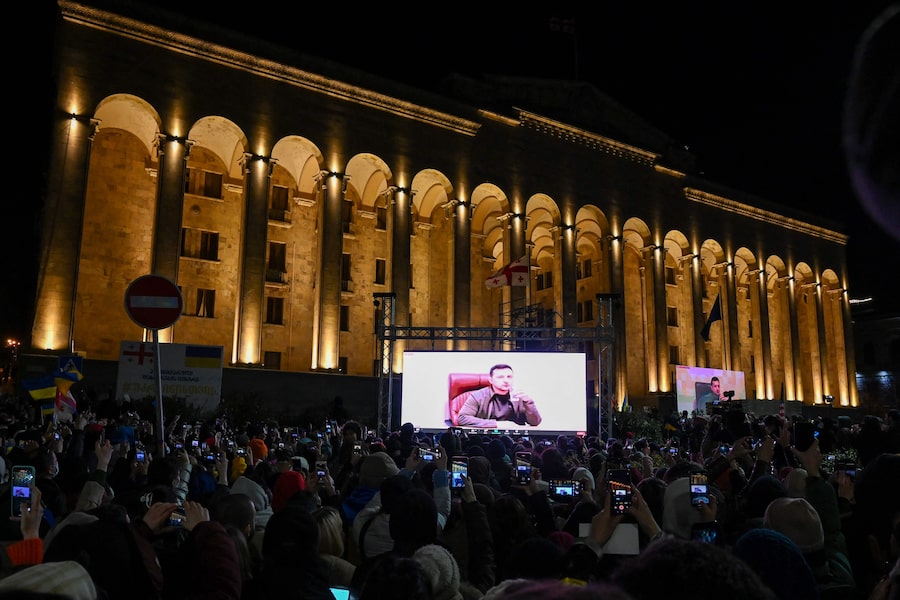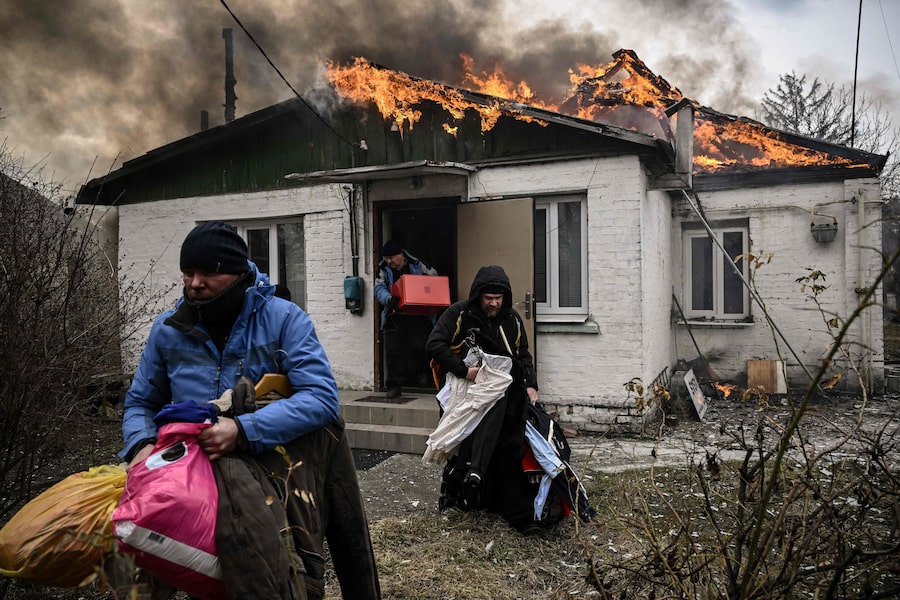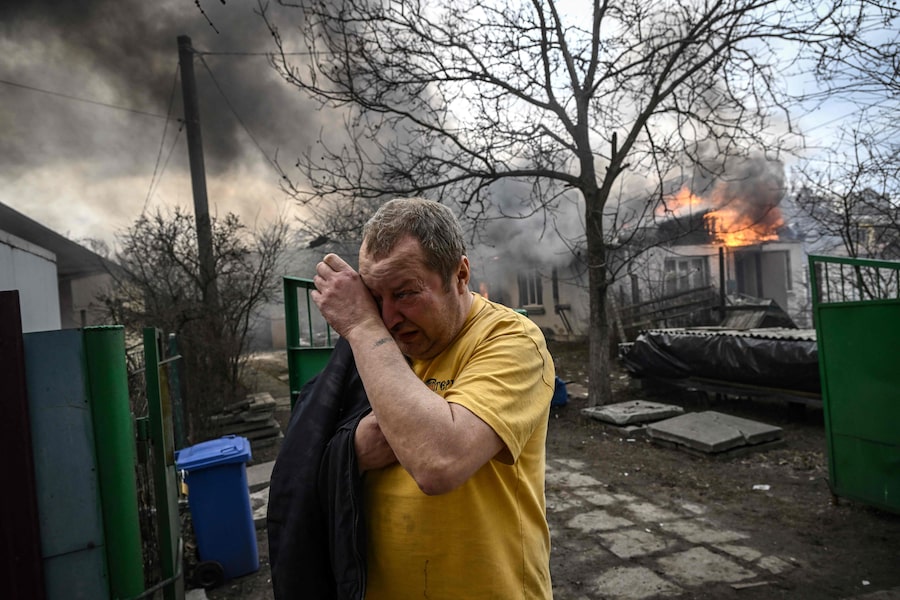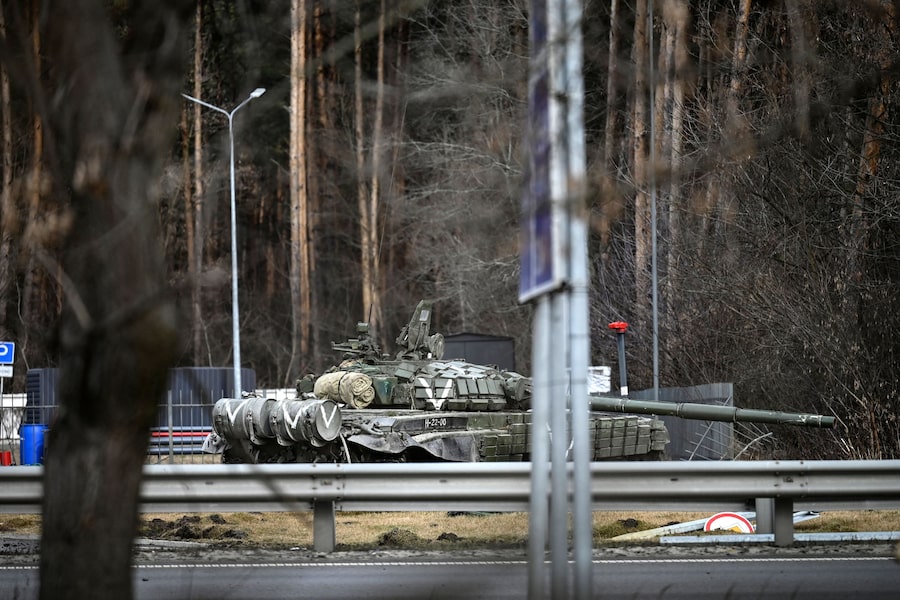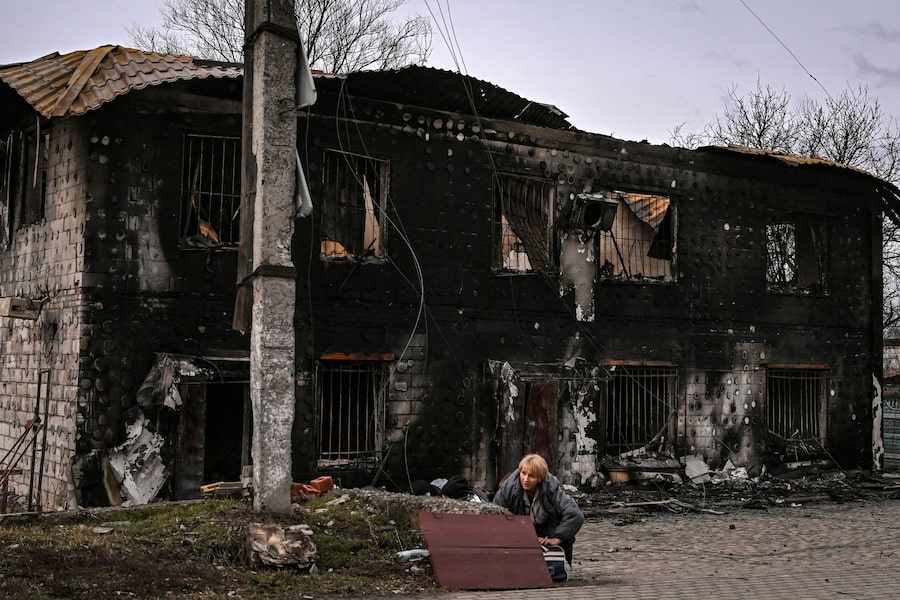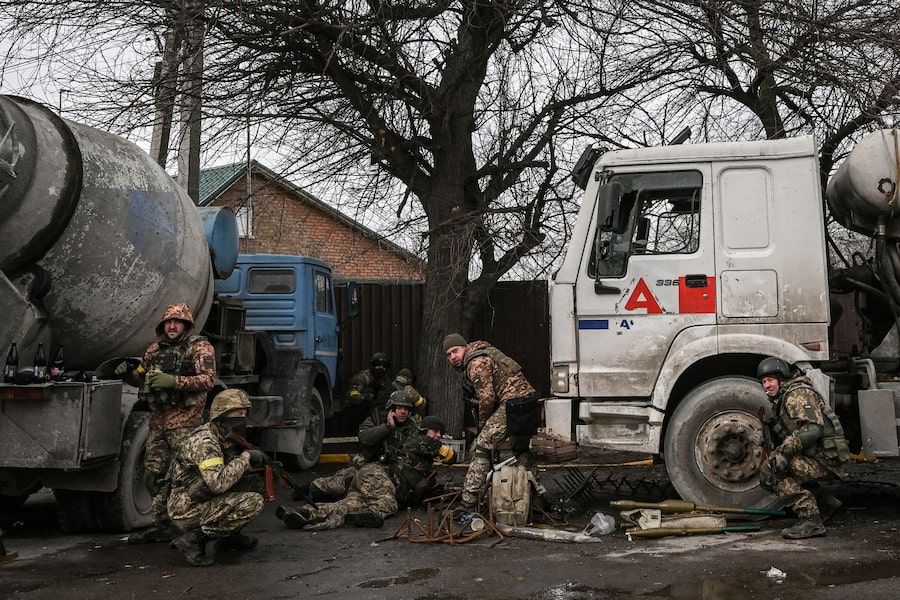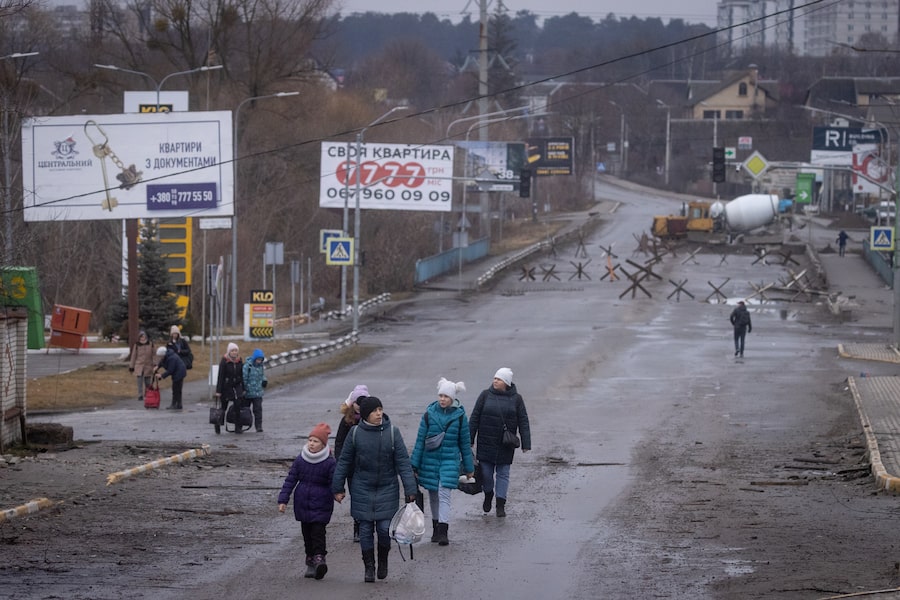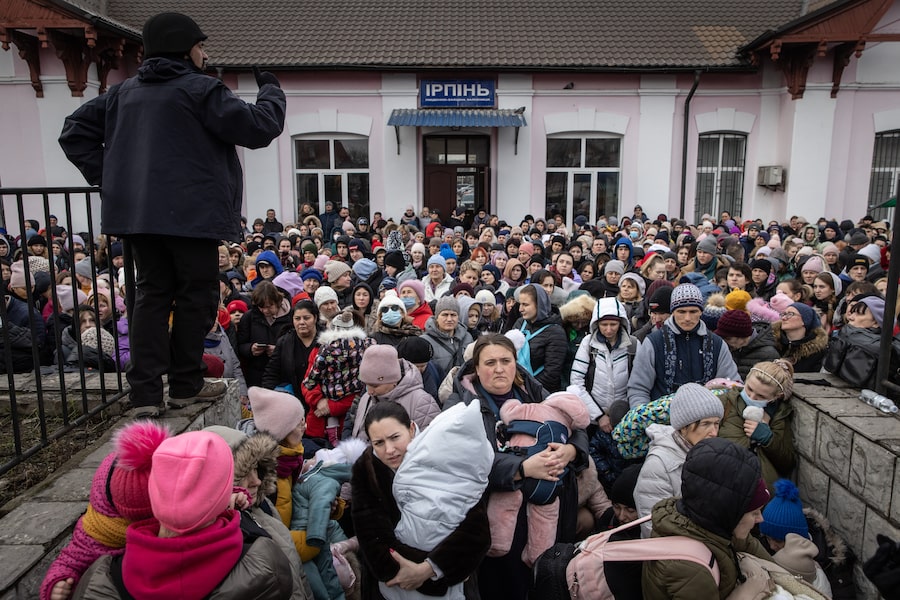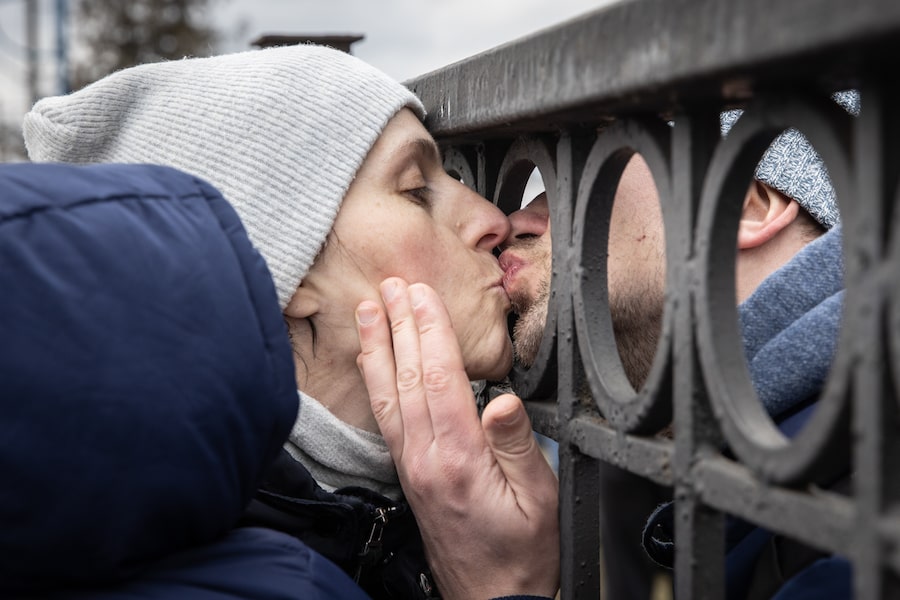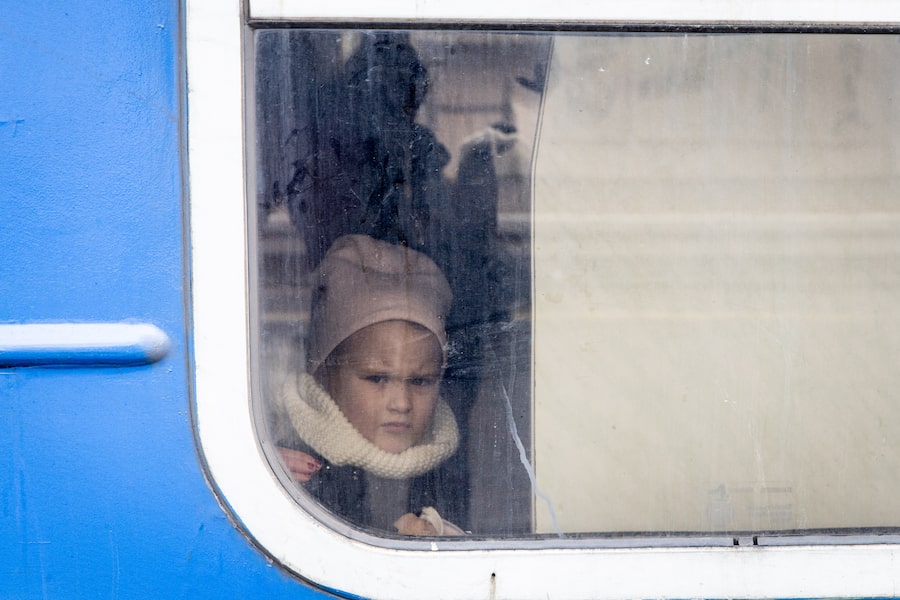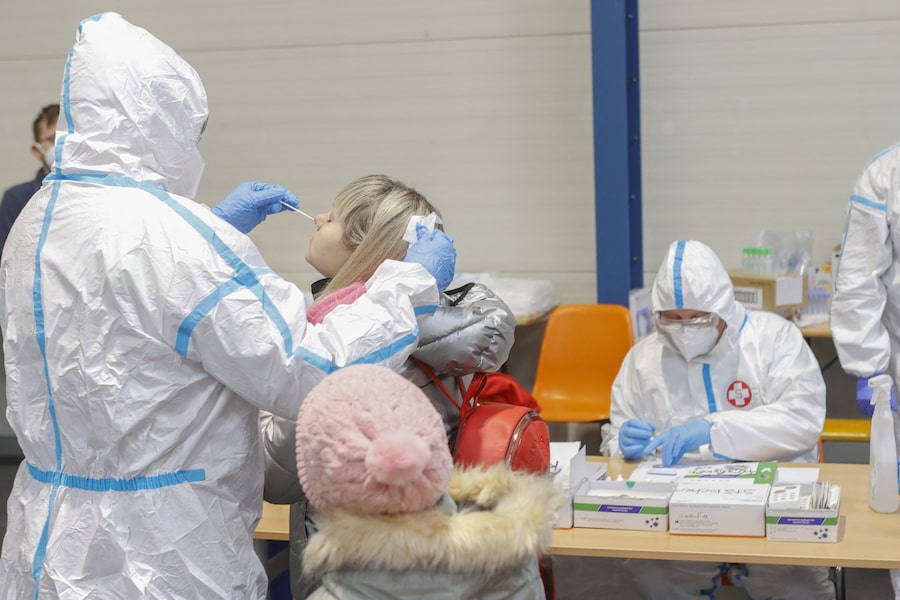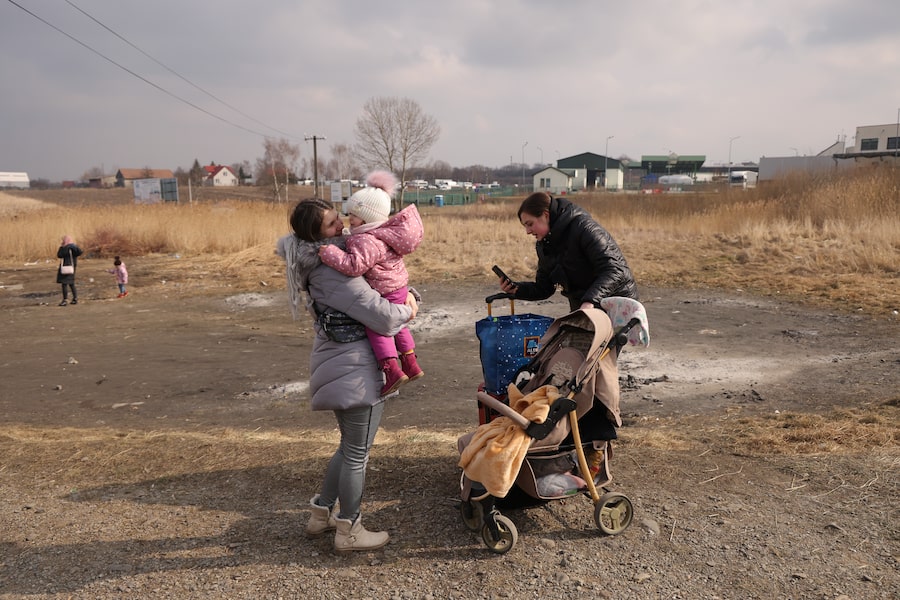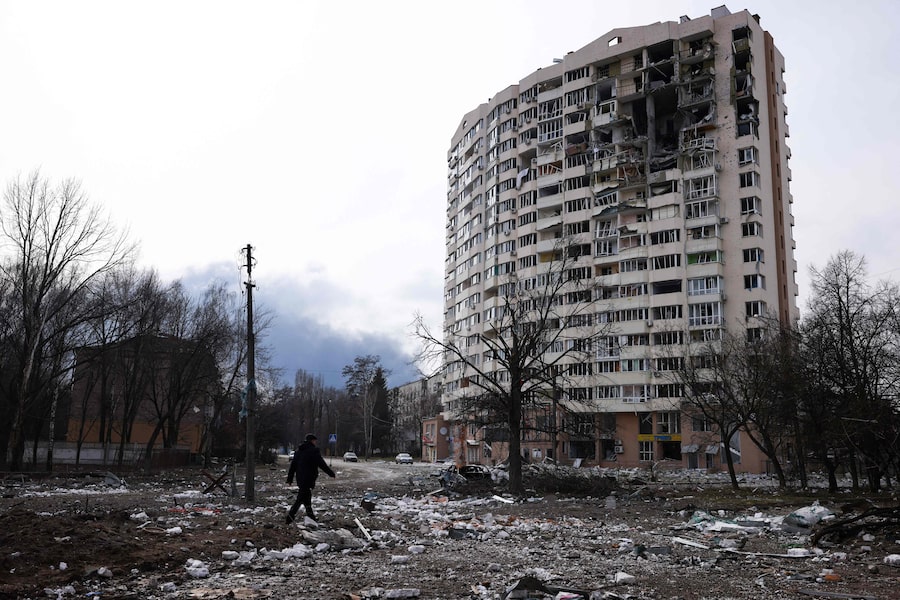This digest has now been archived. Find the latest Russia-Ukraine updates here.
A woman and a little girl react as she cannot immediately board a train departing to Poland following Russia’s invasion of Ukraine at the main train station in Lviv, Ukraine, March 4, 2022.KAI PFAFFENBACH/Reuters
Russia has invaded Ukraine. Here are the latest updates:
- U.S. President Joe Biden is coming under pressure to ban Russian oil imports and send further aid Ukraine.
- Prime Minister Justin Trudeau is heading to Europe for talks with continental leaders about Russia’s brutal war of aggression in Ukraine, and to discuss how the West can counter Kremlin disinformation.
- Russian forces continue to surround or partly surround major centres such as Kyiv, Kharkiv, Mariupol and Chernihiv. Ukrainian President Volodymyr Zelensky appealed for Russian citizens to protest against the invasion.
- Ukrainian operators remain at the helm of Europe’s largest nuclear power plant but Russian military forces have seized control. A fire near the facility was extinguished early Friday.
This is Friday’s live updates story. Follow the latest news.
2:00 a.m. ET
Russia declares partial ceasefire to allow civilian evacuations
The Russian military will observe a ceasefire in two areas of Ukraine starting Saturday to allow civilians to evacuate, Russian state media reported, but there was no immediate confirmation from Ukraine. It would be the first breakthrough in allowing civilians to escape the war.
The Russian Defense Ministry statement carried by the RIA Novosti and Tass agencies said it has agreed on evacuation routes with Ukrainian forces to allow civilians to leave the strategic port of Mariupol in the southeast and the eastern town of Volnovakha “from 10 a.m. Moscow time.” It was not immediately clear from the vaguely worded statement how long the routes would remain open.
The head of Ukraine’s security council, Oleksiy Danilov, had called on Russia to create humanitarian corridors to allow children, women and the elderly to escape the fighting, calling such corridors “question No. 1.”
-The Associated Press
1:56 a.m. ET
Weakening ruble, uncertain future send Russians out to shop
In bright sunshine, a long queue of shoppers snaked outside an IKEA store near Moscow this week. Similar scenes were repeated across Russia as families rushed to spend their fast-depreciating rubles at the Swedish retailer, which is exiting the crisis-hit country.
Russians are bracing for an uncertain future of spiraling inflation, economic hardship and an even sharper squeeze on imported goods.
The ruble has lost a third of its value this week after unprecedented Western sanctions were imposed to punish Russia for invading Ukraine. The moves froze much of the central bank’s $640-billion in reserves and barred several banks from global payments system SWIFT, leaving the ruble in free-fall.
Cities across Russia were outwardly calm, with little sign of the crisis devastating financial sector and markets. Except for the lines of people looking to stock up on products – mostly high-end items and hardware – before shelves empty or prices climb further.
-Reuters
12:02 a.m. ET
UN council to meet on humanitarian situation
A woman holds a child at the Ukrainian-Slovakian border following Russia's invasion of Ukraine, in Vysne Nemecke, Slovakia, March 4, 2022.LUKASZ GLOWALA/Reuters
The U.N. Security Council will hold an open meeting Monday on the worsening humanitarian situation in Ukraine as the Russian offensive intensifies.
The United States and Albania requested the meeting, which will hear briefings by U.N. humanitarian chief Martin Griffiths and Catherine Russell, executive director of the U.N. children’s agency UNICEF, diplomats said Friday.
At the request of France and Mexico, the council meeting will be followed by closed consultations on a draft resolution on the humanitarian plight of millions of Ukrainians that the two countries have been spearheading, the diplomats said, speaking on condition of anonymity because negotiations on the meeting have been private.
The United Nations launched an emergency appeal on March 1 for $1.7 billion to respond to soaring humanitarian needs of both people who fled Ukraine and who remain in the country. It immediately received pledges of $1.5 billion, and has urged that the pledges be turned into cash quickly.
The UN estimates that 12 million people staying in Ukraine and four million fleeing to neighboring countries in the coming months will need humanitarian aid.
-The Associated Press
9:45 a.m. ET
The behind-the-scenes story of Canada’s role in how the West took on Putin
Last Saturday afternoon, leaders from Canada and other Western nations, on calls and video conferences, made the decision to take an unprecedented step to isolate Russian banks – a measure the Ukrainian government had been desperately seeking from the international community.
Later that day, Canada and its allies announced that they would move to block access for key Russian banks to the SWIFT international payment system, in escalating sanctions against Moscow for its military assault on Ukraine. They also hit Russia’s central bank and sovereign-wealth funds, effectively freezing their assets and depriving Russian President Vladimir Putin of money he needs to pay for the war in Ukraine.
The Globe takes readers behind the scenes to the discussions and decisions that have helped shaped the West’s response to the Russian invasion of Ukraine.
- Robert Fife and Steven Chase
9:05 p.m. ET
Pressure builds on Biden to ban Russian oil imports
U.S. President Joe Biden faces growing calls for tougher action on Russian President Vladimir Putin’s invasion of Ukraine, with Kyiv requesting more military help and legislators in the U.S. pushing for an oil embargo on Moscow.
But the White House is reluctant to escalate amid fears of triggering a direct war between NATO and nuclear-armed Russia, and causing economic pain in the U.S. at a time of high inflation.
Ukrainian President Volodymyr Zelensky this week appealed to NATO to either impose a no-fly zone over Ukraine or provide Kyiv with fighter jets.
In a video message, Ukrainian Foreign Minister Dmytro Kuleba warned his Western counterparts of the moral consequences of not stepping up military assistance to his country.
“I’m afraid you will have to share responsibility for the lives and suffering of civilian Ukrainians who died because of ruthless Russian pilots who throw bombs on them,” he said.
Efforts to shut down Russian oil and gas imports, meanwhile, are gaining momentum in the U.S. Congress. Democratic Senator Joe Manchin and Republican Senator Lisa Murkowski this week introduced a bipartisan bill to ban imports to the U.S.
-Adrian Morrow
7:30 p.m. ET
BBC halts reporting in Russia after new law, Bloomberg and CBC follow
The BBC said on Friday it had stopped reporting in Russia after parliament passed a law there imposing a jail term of up to 15 years for anyone found to be intentionally spreading “fake” news.
The Canadian Broadcasting Corp. said it had temporarily suspended reporting from the ground in Russia so it could seek clarity on the new law.
Russian officials have said that false information has been spread by Russia’s enemies such as the United States and its Western European allies in an attempt to sow discord among the Russian people.
Lawmakers passed amendments to the criminal code making the spread of “fake” information an offence punishable with fines or jail terms. They also imposed fines for anyone calling for sanctions against Russia following the invasion of Ukraine.
The Kremlin did not immediately respond to a Reuters request for comment on the BBC move.
BBC Director General Tim Davie said the new legislation appeared to criminalize the process of independent journalism.
“It leaves us no other option than to temporarily suspend the work of all BBC News journalists and their support staff within the Russian Federation while we assess the full implications of this unwelcome development,” he said in a statement.
Reuters
7:00 p.m. ET
6:27 p.m. ET
Global tech conference in Toronto bans businesses from Russia, Belarus

Prime Minister Justin Trudeau participates in an armchair discussion with founder and CEO of BroadbandTV Corp, Shahrfad Rafaiti, at the Collision tech conference in Toronto on May 20, 2019.Chris Young/The Canadian Press
The Collision global technology conference in Toronto is prohibiting all businesses, government officials and media companies with ties to Russia and Belarus from attending.
The conference will take place in late June. It is organized by Connected Intelligence Ltd., which operates under the name Web Summit. Held in Lisbon, the Web Summit conference is one of the world’s largest tech events and has the same managers as Collision.
In a statement on Friday, spokesperson Katherine Farrell said the organizers excluded Russia and Belarus from both conferences to “stand in solidarity with Ukraine and oppose this war of aggression.”
“We have made the decision to prohibit all government members and agencies, state-controlled media, state-backed businesses, and companies with ties to the Russian government, from participating at Web Summit and Collision,” Ms. Farrell said. “Furthermore, all Russian businesses, including public and private companies and startups, will be prohibited from exhibiting at Web Summit and Collision.”
Organizers would not say how many people will be affected by the decision, and declined to name any banned companies or firms.
The Globe’s Temur Durrani
5:57 p.m. ET
‘All the people who die from this day forward will also die because of you’: Zelensky criticizes NATO for refusing to impose no-fly zone over Ukraine
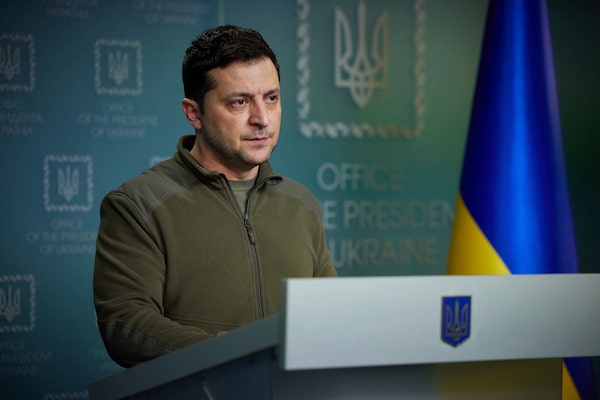
In this photo provided by the Ukrainian Presidential Press Office, Ukrainian President Volodymyr Zelenskyy delivers his speech addressing the nation in Kyiv, Ukraine, Feb. 25, 2022.The Associated Press
In a bitter and emotional speech, Ukraine President Volodymyr Zelensky criticized NATO for refusing to impose a no-fly zone over Ukraine, saying it will fully untie Russia’s hands as it escalates its attack from the air.
“All the people who die from this day forward will also die because of you, because of your weakness, because of your lack of unity,” he said in a nighttime address. “The alliance has given the green light to the bombing of Ukrainian cities and villages by refusing to create a no-fly zone.”
On Friday, NATO refused to impose a no-fly zone, warning that to do so could provoke widespread war in Europe with nuclear-armed Russia.
“All that the alliance was able to do today was to pass through its procurement system 50 tons of diesel fuel for Ukraine. Perhaps so we could burn the Budapest Memorandum,” Zelensky said, referring to the 1994 security guarantees given to Ukraine in exchange for the withdrawal of its Soviet-era nuclear weapons.
“You will not be able to pay us off with litres of fuel for the litres of our blood, shed for our common Europe.”
The Associated Press
5:41 p.m. ET
Russian oligarch could have indirect stake in WestJet through Sunwing deal

A WestJet Airlines Boeing 737 Max aircraft taxis to a gate after arriving at Vancouver International Airport in Richmond, B.C., on Jan. 21, 2021.DARRYL DYCK/The Canadian Press
A Russian oligarch on Europe’s blacklist could end up holding an indirect stake in Onex Corp.’s WestJet Group if the investment company’s takeover of Sunwing Airlines is approved by the Canadian government.
Alexei Mordashov, one of Russia’s wealthiest men, was sanctioned by the European Union on Monday over the country’s invasion of Ukraine. He owns 34 per cent of London-listed tourism giant TUI AG, which owns 49 per cent of Toronto’s Sunwing.
On Wednesday, WestJet announced a deal to buy Sunwing for an undisclosed amount. In the takeover, which requires regulatory approval, TUI and Sunwing owner Stephen Hunter would become minority shareholders of WestJet Group.
Mr. Mordashov, chairman of Russian steel maker Severstal, is not on Canada’s list of 33 oligarchs who face sanctions that include asset freezes and a bar on entry to Canada. The Canadian sanctions also prohibit doing business with those on the list.
Mr. Mordashov resigned from TUI’s supervisory board on Wednesday. Vladimir Lukin, a Russian politician, resigned on Friday, TUI said.
The Globe’s Eric Atkins
5:21 p.m. ET
Major auto makers halt production in Russia, with many citing shortage of parts
Toyota, Mercedes-Benz, Volkswagen, Renault, Hyundai and Stellantis all halted production in Russia, with many saying they had run short of parts.
The war also forced auto makers such as BMW and Volkswagen to cut production or shut down European factories due to a global shortage of computer chips, and because some of their parts came from Ukraine.
Many wouldn’t specify which parts are missing, but Volkswagen said it gets electrical wiring harnesses and numerous interior switches from Ukraine. In the auto business, one missing part can halt production.
Stellantis CEO Carlos Tavares said Friday that the company closed a plant near Moscow that it jointly operates with Mitsubishi due to sanctions and lack of parts. “The supply chain is completely disrupted,” he told reporters.
The rest of the company, he said, has not been affected yet because it generally doesn’t get parts from Eastern Europe.
If the war continues, though, more auto plants could close if companies find that some of their European parts suppliers get smaller components from Ukraine or Russia.
“I’m not excluding that because I know that with a longer pipe you can discover things a few days, if not a few weeks later,” said Tavares, who leads the world’s fourth-largest auto maker. “I will need a couple of more weeks to see if something pops up, but so far it’s OK.”
The Associated Press
4:55 p.m. ET
Ukrainians fleeing war with Russia share the items they couldn’t leave behind
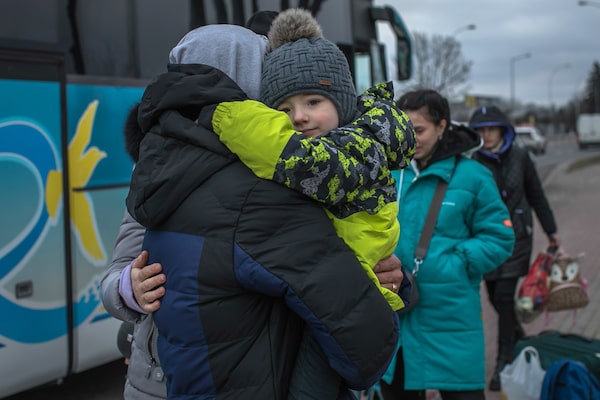
Natalia Panasiuk rushes to hug her husband Olexander, who works in Poland, after arriving in Przemysl with their 3-year old baby Andrej on Feb. 28, 2022.Anna Liminowicz/The Globe and Mail
More than one million Ukrainians have been forced from their homes since the Russian invasion began. Most had only minutes to pack and even less time to think about what to take.
What do you bring when your world has been upended? Sure, you’ll pack clothing, documents and maybe some food. But what else can you cram into a suitcase, a backpack, a purse, a plastic bag or even a pocket that will remind you of the life you’re leaving behind? What can you hold on to that will keep memories alive?
We asked refugees arriving at the Polish border crossing at Przemysl to show us the things they just couldn’t leave without.
The Globe’s Paul Waldie, with photography by the Globe’s Anna Liminowicz
4:44 p.m. ET
Bombardier suspends all activities with Russian clients
A Rosneft-operated Bombardier 6000 aircraft - with tail number M-YOIL flies after taking off at Palma de Mallorca airport, Spain Aug. 6, 2018.STAFF/Reuters
Business jet maker Bombardier Inc. said on Friday it has suspended all activities with Russian clients, as more companies cut ties in the country following the introduction of sweeping sanctions over Russia’s invasion of Ukraine.
Western nations including Canada have imposed sanctions on prominent Russians, taken steps to stop business with the country and closed their airspace to Russian-owned, chartered or operated aircraft.
“We will continue to adhere to international laws, regulations and sanctions, as they evolve,” the Montreal-based company said in a statement.
Bombardier said the suspended activities include all forms of technical assistance.
The company has said about 5 per cent or 6 per cent of its business jet deliveries traditionally go to customers in the region. Its latest reported order backlog is $12.2 billion.
Canada exported nearly C$112 million in aircraft to Russia in 2021, the highest level in the last five years, according to government data.
Reuters
4:16 p.m. ET
Russia blocks access to Twitter, hours after cutting access to Facebook
After blocking Facebook, Russia’s state communications watchdog has quickly followed up by declaring a block on Twitter amid the tensions over the war in Ukraine.
The agency, Roskomnadzor, said Friday it cut access to Twitter in line with the Russian Prosecutor General’s office decision. The watchdog has previously accused Twitter of failing to delete the content banned by the Russian authorities and slowed down access to it.
The government is seeking to stifle independent voices about the invasion of Ukraine. The moves against Facebook and Twitter came shortly after officials prevented Russians from accessing reporting from the BBC, German broadcaster Deutsche Welle, Latvia-based website Meduza and the U.S. government-funded Voice of America and Radio Free Europe/Radio Liberty.
The Associated Press
3:40 p.m. ET
Russian tycoons moor their yachts in Maldives
3:36 p.m. ET
Ukraine UN ambassador accuses Russia of committing ‘nuclear terrorism’ after largest nuclear power plant attacked
Ukrainian Ambassador to the U.N. Sergiy Kyslytsya attends an emergency meeting of the United Nations Security Council after Russia's invasion of Ukraine, in New York City, U.S., March 4, 2022.CARLO ALLEGRI/Reuters
Ukraine’s UN ambassador is accusing Russia of committing “an act of nuclear terrorism” by attacking the country’s largest nuclear power plant and is dismissing as “lies” his Russian counterpart’s claim that a “Ukrainian sabotage group” was responsible for setting fire to a training facility at the plant.
Ambassador Sergiy Kyslytsya told an emergency meeting of the UN Security Council on Friday that as a result of Russian shelling on the territory of the Zaporizhzhia nuclear plant, a fire broke out killing and injuring several people.
The plant is currently under control of the Russian armed forces, he said, and “it is alarming that several employees responsible for maintaining nuclear security at the site have reportedly been killed by Russian soldiers,” and “there has been no rotation of personnel since yesterday morning.”
While there have been no changes in radiation levels, Kyslytsya said several buildings are damaged and the telephone connection to the plant “is disrupted and not available at the moment.”
Describing the state of the plant’s nuclear power facilities, he said, Unit One “is in outage, its main building is damaged” and “the overpass of the special building is damaged.” Units Two and Three “have been disconnected from the grid” and are being cooled down, Unit Four is in operation at 690 megawatts power, and Units Five and Six are being cooled down, he said.
Kyslytsya accused Russia of deliberately attacking the nuclear power site in violation of numerous international agreements and said Russian Ambassador Vassily Nebenzia, who blamed a “Ukrainian sabotage group,” may not be properly informed by his government.
The Associated Press
3:16 p.m. ET
Which countries are taking in Ukraine’s 1.2 million refugees?
In seven days, 1.2 million Ukrainians – just over 2 per cent of the total population – have fled the country, with most exiting to neighbouring Poland. The UN has warned it’s likely to become the biggest refugee crisis in Europe this century. Here’s what you need to know.
2:35 p.m. ET
Zelensky addresses protesters across Europe
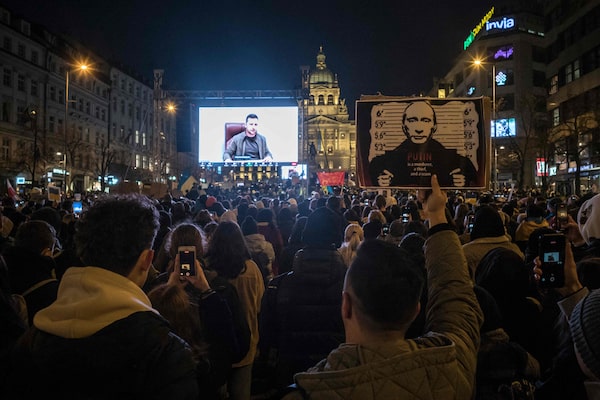
Protestors listen to a speech of Ukrainian President Volodymr Zelensky screened during a demonstration against Russia's invasion of Ukraine, on March 4, 2022 at the Venceslas square in Prague, Czech Republic.MICHAL CIZEK/AFP/Getty Images
Ukrainian President Volodymyr Zelensky called on the European nations to support his country’s fight against the invading Russian military.
Zelensky appeared on video as he addressed thousands of people protesting the war in several European cities, naming among them Paris, Prague, Lyon, Frankfurt and others. He asked the big crowds not to be silent about what’s going on in his country.
“Don’t turn a blind eye on this,” he said. “Come out and support Ukraine as much as you can,” he said though a translator.
“If we fall, you will fall,” he said.
“And if we win, and I’m sure we’ll win, this will be the victory of the whole democratic world, this will be the victory of our freedom, this will be the victory of light over darkness, of freedom over slavery. And if we win we will become as blossoming as Europe. And Europe will be flourishing more than ever,” he said.
“All of you are Ukrainians today, thank you for this.”
The Associated Press
2:02 p.m. ET
G7 says those responsible for Russian attacks on Ukrainian civilians will be held accountable
Foreign ministers from the Group of Seven major world powers say that those responsible for Russian military attacks on civilians in Ukraine must be held accountable for their crimes, amid reports of the use of cluster bombs and other banned munitions.
In a statement after talks in Brussels on Friday, the G7 ministers said they are “deeply concerned with the catastrophic humanitarian toll taken by Russia’s continuing strikes against the civilian population of Ukraine’s cities.”
They underlined that “indiscriminate attacks are prohibited by international humanitarian law,” and that they “will hold accountable those responsible for war crimes, including indiscriminate use of weapons against civilians.”
The ministers also welcomed the investigations and evidence-gathering being done to establish what war crimes might have been committed in Ukraine.
The International Criminal Court prosecutor has launched an investigation that could target senior officials believed responsible for war crimes, crimes against humanity or genocide amid a rising civilian death toll and widespread destruction of property.
The Associated Press
1:30 p.m. ET
Russia blocks Facebook after Meta restricts access to RT and Sputnik
Russia is blocking Meta Platforms Inc’s Facebook, the country’s communications regulator said on Friday, in response to what it said were restrictions on access to Russian media on the platform.
The regulator, Roskomnadzor, said there had been 26 cases of discrimination against Russian media by Facebook since October 2020, with access restricted to state-backed channels like RT and the RIA news agency.
Meta’s head of global affairs Nick Clegg said the company would continue to do everything it could to restore its services.
“Soon millions of ordinary Russian will find themselves cut off from reliable information, deprived of their everyday ways of connecting with family and friends and silenced from speaking out,” he said, in a statement posted on Twitter.
Reuters
12:56 p.m. ET
Trudeau heads to Europe for talks on Ukraine and Russian disinformation
Prime Minister Justin Trudeau arrives for a news conference on the Canadian Digital Adoption Program at Bayview Yards in Ottawa, on March 3, 2022.Justin Tang/The Canadian Press
Prime Minister Justin Trudeau is heading to Europe for talks with continental leaders about Russia’s brutal war of aggression in Ukraine, and to discuss how the West can counter Kremlin disinformation.
Mr. Trudeau announced Friday that he will leave Sunday to travel to London, Berlin, Warsaw and Latvia, where several hundred Canadian soldiers are stationed.
The discussions will centre on what other measures the West can take to stand up to Russia and to “combat the kind of disinformation and misinformation that is a facet... of this war in Ukraine,” he told reporters at an event in Mississauga.
He condemned President Vladimir Putin’s musing about using weapons and criticized Russia’s seizure of Europe’s biggest nuclear power plant in Ukraine in a firefight that caused alarm around the world.
The Prime Minister said co-ordinated and severe sanctions are working to cripple the Russian economy, but he ruled out pushing the NATO alliance to impose a no-fly zone over Ukraine.
The Globe’s Robert Fife and Steven Chase
12:45 p.m. ET
Brazil to issue temporary visas for Ukrainians fleeing from Russian invasion
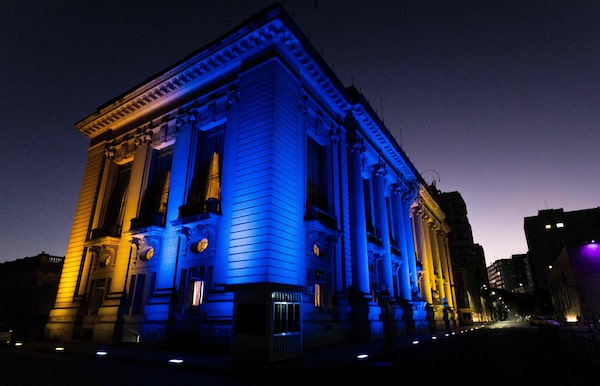
The Palacio Piratini, seat of the Rio Grande do Sul state Government, is illuminated with the colours of the Ukrainian flag in solidarity with Ukraine, in Porto Alegre, Brazil, on March 2, 2022.SILVIO AVILA/AFP/Getty Images
Brazil’s government said on Friday it will issue temporary humanitarian visas and residency permits for Ukrainian nationals and other individuals who have been affected or displaced by the conflict with Russia.
The visas will be valid for 180 days and arriving Ukrainians can apply for residency permits lasting two years, according to the text published in the nation’s official gazette. Brazil will require, among other documents, a certificate attesting to the person’s clean criminal record.
Brazilian media have reported that the country has Latin America’s biggest population of Ukrainians and their descendants, ranging between 500,000 and 600,000, according to an estimate from Ukraine’s embassy.
The administration of President Jair Bolsonaro has been ambivalent about the conflict. Bolsonaro himself expressed solidarity with his Russian counterpart Vladimir Putin on a recent visit, and has said Brazil will retain a neutral stance in the conflict. At the same time, Brazil voted to condemn the invasion in the meeting of the United Nations’ Security Council.
The Associated Press
12:35 p.m. ET
Rouble falls over 20 per cent in Moscow as sanctions bite Russian economy
The rouble ended the week down more than 20 per cent against the dollar and euro in Moscow trading on Friday as the country’s economy buckles under the pressure of sanctions meant to isolate Russia in response to its invasion of Ukraine.
Russia’s credit rating was cut deeper into junk by S&P Global, following similar moves from Moody’s and Fitch, as international sanctions ramped up the chances of a default and the U.S. Embassy in Ukraine called the overnight Russian assault on Europe’s biggest nuclear power plant a “war crime.”
Thousands of people are believed to have been killed or wounded and more than 1 million refugees have fled Ukraine since the Feb. 24 start of the Russian invasion.
The rouble ended the week at 115 per dollar from 83 last Friday in Moscow, though it strengthened 1 per cent on the session from its Thursday close. Against the euro , it closed just below 119 from 93 last week. It hit a record low against the dollar on Thursday, and the euro on Friday.
Reuters
12:01 p.m. ET
Russian convoy advancing on Kyiv has made little progress in days, Western official says
A satellite image collected over Ivankiv shows a Russian military convoy passing through scorched countryside, northwest of Kyiv, Ukraine Feb. 28, 2022.BLACKSKY/Reuters
A Western official says a huge Russian military convoy advancing on Kyiv has made little progress for several days.
The official said the convoy, which has been estimated at up to 64 kilometres long, had become a huge traffic jam that included damaged or destroyed vehicles.
The official, who spoke on condition of anonymity to discuss intelligence, said the convoy had been attacked from the air by the Ukrainians, but that Ukraine’s ability to do so was limited.
The official assessed that Ukrainian forces remain in control of much of the country’s territory but that Russia holds the cities of Kherson, Melitopol and Berdiansk in the south.
Multiple Western officials have said Russia’s invasion of Ukraine has advanced more slowly than planned, with Russian forces meeting stiff Ukrainian resistance and encountering myriad logistical problems.
Russian President Vladimir Putin said Thursday that what he calls a “special military operation” was on course to meet its goals.
The Associated Press
11:45 a.m. ET
Putin ready for talks, but says Ukraine must meet Russia’s demands
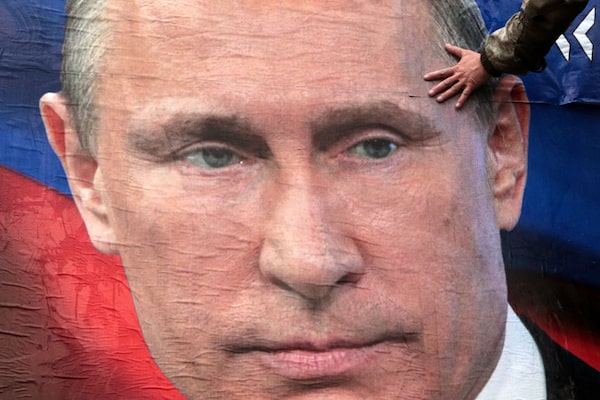
A man finishes gluing huge placards bearing images of Russian President Vladimir Putin in the city centre of Simferopol, Crimea, on March 4, 2022.STRINGER/AFP/Getty Images
President Vladimir Putin says Russia is ready for talks with Ukraine but insisted that it must meet Moscow’s demands.
Putin told German Chancellor Olaf Scholz that Ukraine must agree to demilitarize, accept Moscow’s sovereignty over Crimea and surrender territory to Russia-backed rebels in the east, the Kremlin said in its readout of Friday’s call.
Russia annexed Ukraine’s Crimean Peninsula in 2014 following the ouster of the country’s former Moscow-friendly leaders and cast its support behind the rebels in eastern Ukraine.
Putin recognized the separatist “people’s republics” as independent states just before he launched an invasion of Ukraine on Feb. 24, citing their plea for military assistance.
Russian and Ukrainian negotiators on Thursday held the second of two rounds of talks, reaching a tentative agreement on setting up safe corridors to allow civilians to leave besieged Ukrainian cities and the delivery of humanitarian supplies. They also agreed to keep talking on ways to negotiate a settlement, but Putin’s tough demands make prospects for a compromise look dim.
Ukrainian negotiators said the parties may conduct another round of talks over the weekend.
The Associated Press
10:57 a.m. ET
Besieged Ukrainian city of Mariupol is running out of food: mayor
Fire is seen in Mariupol after Russia launched a massive military operation against Ukraine, March 3, 2022, in this image obtained from social media.UGC/Reuters
The Ukrainian city of Mariupol has no water, heat or electricity and is running out of food after coming under attack by Russian forces for the past five days, its mayor said on Friday.
Mayor Vadym Boychenko made a televised appeal for military help and said a humanitarian corridor should be created to evacuate civilians from the southeastern port city.
“We are simply being destroyed,” he said.
Reuters
10:25 a.m. ET
NATO rejects no-fly zone over Ukraine, warns war is entering a more dangerous phase
A general view of US Secretary of State Antony Blinken and meeting of NATO, G7 and EU counterparts on the response to Russia?s invasion of Ukraine and the growing refugee situation in Brussels, Belgium, March 4, 2022.POOL/Reuters
NATO and its foreign ministers rejected Kyiv’s idea of setting up a no-fly zone over Ukraine in spite of warnings from the alliance’s secretary-general, Jens Stoltenberg, that the war is about to become more vicious and bloodier.
At a news conference Friday afternoon at NATO’s headquarters in Brussels, Mr. Stoltenberg said that more civilian casualties were inevitable as Russia moved in heavy weapons to bombard cities.
He said: “With cities under siege, schools, hospitals and buildings shelled. Reckless actions around a nuclear power plant last night and many civilians killed or wounded. The days to come are likely to be worse, with more deaths, more suffering, and more destruction.”
He said Russia’s violent takeover of the Zaporizhzhia nuclear plant, the largest of its kind in Europe, shows that “war is dangerous and to have military operations, conflict fighting, going around the nuclear power plant adds to the danger.”
The Globe’s Eric Reguly in Brussels
9:51 a.m. ET
U.N. Security Council to hold emergency meeting after Russian attack on nuclear plant
The United Nations Security Council will hold an emergency meeting on Friday at 11:30 a.m. ET following Russia’s attack on Zaporizhzhya nuclear power plant in Ukraine, diplomats said.
“The United States, the U.K., France, Ireland, Norway, and Albania have called an emergency UN Security Council meeting at 11:30ET following Russia’s attack on the Zaporizhzhya nuclear plant in Ukraine,” Olivia Dalton, spokesperson for the U.S. mission to the United Nations, tweeted.
Several countries including the United States and the United Kingdom are expected to make remarks at the meeting.
-Reuters
9:39 a.m. ET
Ukraine to confront Russia at International Court of Justice on Monday
Ukraine and Russia will face off Monday at the International Court of Justice in a hearing on emergency measures sought by Kyiv to order Moscow to suspend military operations, with Russia’s legal team weakened by the resignation of a key lawyer.
The case lodged by Ukraine at the U.N. court centres on the interpretation of a 1948 treaty on the prevention of genocide, signed by both Russia and Ukraine.
The court is named in the treaty itself as the forum for resolving disputes related to it, and Ukraine’s suit argues that Russia has misinterpreted the treaty in several ways.
Russian President Vladimir Putin has suggested in televised addresses that Russia’s invasion of Ukraine – which he calls a “special military action” – was justified by the need “to protect people who have been subjected to bullying and genocide... for the last eight years” in Eastern Ukraine.
Kyiv’s suit argues there is no evidence that genocide has taken place or will take place in Eastern Ukraine. It asked the court to establish that “Russia has no lawful basis to take action in and against Ukraine for the purpose of preventing and punishing any purported genocide.”
-Reuters
9:10 a.m. ET
Microsoft suspends product sales and services in Russia
Microsoft Corp said on Friday it is suspending new sales of its products and services in Russia, following an escalation in the Russia-Ukraine conflict.
Scores of Western companies, including Apple Inc, Nike and Dell Technologies, have severed connections with Russia against the backdrop of Western nations imposing sanctions.
Apple said on Tuesday said it had paused all product sales in Russia.
In addition to suspending new sales, Microsoft was stopping many aspects of its business in Russia in compliance with government sanctions, the company’s president Brad Smith said.
-Reuters
8:48 a.m. ET
Swiss adopt new EU sanctions on Russia
The Swiss government on Friday widened sanctions against Russia in step with further measures imposed by the European Union, tightening exports and financial services to the country over the biggest attack on a European state since World War Two.
In a sharp deviation from its traditional neutrality, Switzerland moved on Monday to adopt sanctions that the European Union (EU) imposed on Russian people and companies and freeze their assets to punish the invasion of Ukraine.
The 27-member EU bloc has approved an array of financial, energy, export and travel bans since last week.
These have included a freeze on Russian central bank assets, the shutdown of EU airspace to Russia, the removal of a number of Russian banks from the SWIFT international payments system, and sanctions on a clutch of Russian tycoons.
Switzerland on Friday adopted new financial measures – including banning transactions with the Russian Central Bank and adopting the EU’s SWIFT measures – while also blocking a number of exports to Russia.
-Reuters
7:40 a.m. ET
Coinbase, Binance resist calls to kick Russians off crypto platforms
Two of the world’s biggest cryptocurrency exchanges, Coinbase Global Inc and Binance, rejected calls on Friday for a blanket ban on all Russian users to stop their platforms from being used as a way round Western sanctions.
By staying put in Russia despite the invasion of Ukraine, the two exchanges are diverging from mainstream finance in a way some anti-money laundering experts and European regulators say weakens Western attempts to isolate Moscow.
“We believe everyone deserves access to basic financial services unless the law says otherwise,” Coinbase Chief Executive Officer Brian Armstrong said in a series of tweets on Friday.
The exchange, however, would enforce such a blanket ban if the U.S. government decides to impose one, Armstrong added.
-Reuters
7:13 a.m. ET
UN rights body approves probe into alleged Russian violations in Ukraine
The UN Human Rights Council voted overwhelmingly on Friday for a resolution condemning alleged rights violations by Russia during its invasion of Ukraine and setting up a commission of inquiry to investigate them.
Thirty-two members of the Council voted in favour of the resolution brought by Ukraine, and two – Russia and Eritrea – voted against, while 13 abstained.
-Reuters
7:02 a.m. ET
Russian attack on power plant stirs fury, fear
Ukrainian operators remain at the helm of Europe’s largest nuclear power plant but Russian military forces have seized control of the station, a situation the head of the International Atomic Energy Agency described Friday as a state of “normal abnormality.”
Only one of the six reactors at the Zaporizhzhia Nuclear Power Station continues to operate, after two reactors were disconnected in an emergency operation as Russian forces attacked the station overnight. The plant normally produced a fifth of Ukraine’s electricity.
The unprecedented military assault on an operating nuclear plant – which left three dead and two wounded, according to local authorities – has raised global alarm over the potential for a nuclear catastrophe. Inside Ukraine, it has stirred fury.
“People of Ukraine! We survived the night that could have stopped the course of history – history of Ukraine, history of Europe,” Ukrainian President Volodymyr Zelensky said in a video address Friday morning. He used the attack on Zaporizhzhia to repeat calls for further European intervention. Ukraine has demanded the enforcement of a no-fly zone, which European leaders have rejected for fear of engaging in direct conflict with Russia.
-The Globe’s Nathan VanderKlippe in Romania
6:48 a.m. ET
Russia’s offer to foreign firms: stay, leave or hand over the keys
Companies and investors across the world faced Russian dilemmas on Friday as they weighed up an offer from Moscow to fast-track their exits from the country and allow them to hand over holdings to local managers until they return.
The options offered by First Deputy Prime Minister Andrei Belousov came one week since Russia’s invasion of Ukraine and a day after French bank Société Générale warned that it could be stripped of its Russian operations, which sent a chill through companies seeking to stay put in the country.
Belousov outlined three alternatives for foreign firms.
“The company continues to work fully in Russia,” he said in a statement. “Foreign shareholders transfer their share to be managed by Russian partners and can return to the market later,” he added, and: “The company permanently terminates operations in Russia, closes production and dismisses employees.”
-Reuters
6:15 a.m. ET
UN rights body approves probe into alleged Russian violations in Ukraine
The U.N. Human Rights Council voted overwhelmingly on Friday for a resolution condemning alleged rights violations during Russia’s military actions in Ukraine and setting up a commission of inquiry to investigate them.
“It is our common duty to ensure accountability by mandating the documentation and verification of Russia’s crimes and identification of those responsible,” Ukraine’s ambassador to the United Nations in Geneva, Yevheniia Filipenko, told the Council minutes before the vote.
Russia has denied targeting civilians in Ukraine and its delegate Evgeny Ustinov told the Council that the resolution’s backers “will use any means to blame Russia for the events in Ukraine.”
-Reuters
5:49 a.m. ET
Russia relentlessly attacks cities throughout Ukraine, takes control of nuclear plant
Ukraine awoke a country in agony on Friday, with its capital hit by fresh missile strikes and multiple cities under grinding Russian siege.
At a children’s hospital in the northern city of Chernihiv, which is surrounded on all sides by Russian forces, the cancer ward has run out of painkillers, and will soon run out of food.
“I need most to be in a secure place, and to continue his treatment. It means to leave this city, which is being occupied every day, every hour, more and more,” Yana, the mother of two-year-old, Nikita, one of the 11 children trapped in the cancer ward, said in a video shared with The Globe. “We want to be moved to a secure place. Just to continue our treatment. There’s nothing more I need.”
The video was filmed in the basement bomb shelter underneath the Chernihiv Regional Children’s Hospital. On Thursday alone, 47 people were killed in Russian air strikes on the city. “Our morgue is full now,” said Serhiy Zosimenko, who works for a non-government organization that supports the cancer ward. “They destroyed two schools and two volunteer centres. Because they want to make a humanitarian catastrophe here in Chernihiv. They know that the volunteers help with food and medicine and medical supplies for civilians. That’s why they decided to kill them all.”
In the town of Volnovakha, on the front line in Eastern Ukraine, Dmytro Lubinets, the local MP, said bodies are lying on the streets and there are so many dead that it’s impossible to count.
“I can’t tell you figures at all – we can’t guess how many people left, there are definitely indeed bodies lying on the streets because we can’t get to them to deliver burials,” Mr. Lubinets said in a telephone interview. He said thousands of people were still stuck in the town, which had a pre-war population of 21,000, as it was pounded by relentless Russian shelling. “There are two schools we can’t reach and know there are huge basements used as shelters, but we can’t get there so we don’t know the conditions.”
Meanwhile, Russian forces took control of the Zaporizhzhia Nuclear Power Station – the largest in Europe – after an overnight attack on the facility that produces a fifth of Ukraine’s electricity. A fire broke out at a training building for the plant as a result of early morning shelling, Ukraine’s state emergency service said. That was extinguished by daybreak and no rise in radiation levels was reported at the site.
-The Globe’s Mark MacKinnon in Ukraine
5:41 a.m. ET
Russia restricts access to BBC and Voice of America: RIA
Russia’s state communications watchdog said on Friday it had blocked the BBC, Voice of America, Radio Free Europe/Radio Liberty, Deutsche Welle and other media outlets for spreading “fake” information, the RIA news agency reported.
Russian officials accuse the West of spreading false information about Russia’s invasion of Ukraine. Moscow describes it as a “special military operation.” President Vladimir Putin has described the West as an “empire of lies.”
“The grounds for restricting access to (these) resources was their deliberate and systematic circulation of (reports) containing false information,” RIA quoted Roskomnadzor, the watchdog, as saying.
It said the fakes regarded “the essence of the special military operation in Ukraine, its form, the methods of combat operations (attacks on the population, strikes on civilian infrastructure), the Russian armed forces’ losses and civilian victims.”
-Reuters
5:12 a.m. ET
Russia fights back in information war with jail warning
Russia’s parliament on Friday passed a law imposing a jail term of up to 15 years for spreading intentionally “fake” information about the armed forces as Moscow fights back in what it casts as an information war over the conflict in Ukraine.
Russian officials have repeatedly said that false information has been intentionally spread by Russia’s enemies such as the United States and its Western European allies in an attempt to sow discord among the Russian people.
Russian lawmakers passed amendments to the criminal code making the spread of “fake” information a criminal offence punishable with fines or jail terms. Lawmakers also imposed fines for public calls for sanctions against Russia.
“If the fakes lead to serious consequences then imprisonment of up to 15 years threatens,” the lower house of parliament, known as the Duma in Russian, said in a statement.
-Reuters
4:51 a.m. ET
Ukraine’s president urges Russians to protest over attack on nuclear plant
Ukrainian President Volodymyr Zelensky appealed to Russians on Friday to stage protests over Russian forces’ seizure of the largest nuclear power plant in Europe.
A building at the Zaporizhzhia nuclear plant was set ablaze during intense fighting, Ukrainian authorities said on Friday, triggering fears of a potential nuclear disaster. The blaze was later extinguished.
“Russian people, I want to appeal to you: how is this possible? After all we fought together in 1986 against the Chernobyl catastrophe,” he said in a televised address, evoking memories of the world’s worst nuclear disaster.
“You have to ... take to the streets and say that you want to live, you want to live on earth without radioactive contamination. Radiation does not know where Russia is, radiation does not know where the borders of your country are.”
Russia’s defence ministry blamed the attack at the site of the Zaporizhzhia nuclear power plant on Ukrainian saboteurs, calling it a monstrous provocation.
-Reuters
4:10 a.m. ET
Chinese use cash to maintain Russian oil imports
Chinese refiners are paying for Russian crude oil using cash transfers to maintain imports from Russia’s Fast East, as banks shy away from financing the oil because of sanctions, sources with knowledge of the matter said.
Global oil prices have soared to their highest in a decade as banks halted financing Russian oil after the United States and other countries ramped up sanctions on Moscow.
Spot crude premiums and freight rates also spiked, piling on buyers’ costs.
Several European and U.S. refiners have stopped buying Russian oil this week, even though Washington said Russian oil and gas are exempted from sanctions.
But Chinese buyers are looking to maintain purchases of ESPO Blend crude exported from Russia’s Far East Kozmino port using other payment methods as they cannot secure letters of credit from banks, trade sources said.
– Reuters
2:40 a.m. ET
Ukraine confirms Russia has taken control of nuclear facilities
Russian forces have taken control of Europe’s biggest nuclear power plant after an overnight attack on a facility that produces a fifth of Ukraine’s electricity, with the country’s regulator warning that an accident now could produce the world’s worst nuclear disaster.
A fire broke out at a training building for the Zaporizhzhia Nuclear Power Station as a result of early morning shelling, Ukraine’s state emergency service said. That was extinguished by daybreak and rise in radiation levels was reported at the site.
But only one of the plant’s six units remains in operation, the State Nuclear Regulatory Inspectorate of Ukraine reported Friday morning. Two of the plant’s six units have been disconnected from the grid and a further two are being cooled down, it said. Plant personnel continue their work, while inspections are being carried out to examine any damage.
But the consequences of a mistake are dire, the regulator warned.
“The loss of the possibility to cool down nuclear fuel will lead to significant radioactive releases into the environment,” it said. “As a result, such an event may exceed all previous accidents at nuclear power plants, including the Chernobyl accident and the accident at the Fukushima Daiichi nuclear power plant.”
The International Atomic Energy Agency said the fire “has not affected ‘essential’ equipment.”
-Nathan VanderKlippe
2:39 a.m. ET
China urges Russia, Ukraine to ensure safety of nuclear sites
China’s Foreign Ministry on Friday urged all sides to ensure the safety of nuclear facilities in Ukraine, after a fire broke out in a building adjacent to a nuclear plant there during intense fighting.
“We will monitor the situation and call on all sides to exercise restraint, avoid escalation and ensure the safety of relevant nuclear facilities,” ministry spokesman Wang Wenbin told a daily briefing.
-Reuters
2:04 a.m. ET
Russia curbs access to BBC Russian service, Radio Liberty
Russia’s communications watchdog has restricted access to the Russian-language websites of the BBC and Radio Liberty for spreading what it cast as false information about the conflict in Ukraine.
Russia’s RIA news agency said access to the websites of BBC Russian service as well as Radio Liberty and the Meduza media outlet were being limited, citing the media watchdog’s official register.
According to an official notice received on March 3, the Russian communications watchdog said Radio Liberty’s Russian service had spread “obviously fake socially significant information about the alleged Russian attack on Ukrainian territory.”
-Reuters
1:38 a.m. ET
Russian invasion looms over China’s annual National People’s Congress
China’s 3,000-member ceremonial parliament will open its annual session Saturday with the government facing a slowing economy and international pressure over its refusal to condemn Russia’s invasion of Ukraine.
While domestic issues typically dominate the National People’s Congress, the war in Ukraine is highlighting the ideological confrontation between the American-led West and the competing world view of Beijing and Moscow.
Any discussion of the conflict is expected to muted, however, with the focus on boosting growth in the world’s second-largest economy.
-The Associated Press
12:30 a.m. ET
Ukrainians put out fire at nuclear complex
A fire that broke out in a training building near the largest nuclear power plant in Europe during intense fighting between Russian and Ukrainian forces has been extinguished, Ukraine’s state emergency service said on Friday.
Earlier, a video feed from the plant verified by Reuters showed shelling and smoke rising near a five-storey building at the plant compound.
The footage shot at night showed one building aflame, and a volley of incoming shells, before a large candescent ball lit up the sky, exploding beside a car park and sending smoke billowing across the compound. It was not immediately clear who was in control of the plant.
-Reuters
Thursday, March 3
11:54 p.m. ET
Resettlement agencies in Canada gear up for influx of Ukrainian arrivals
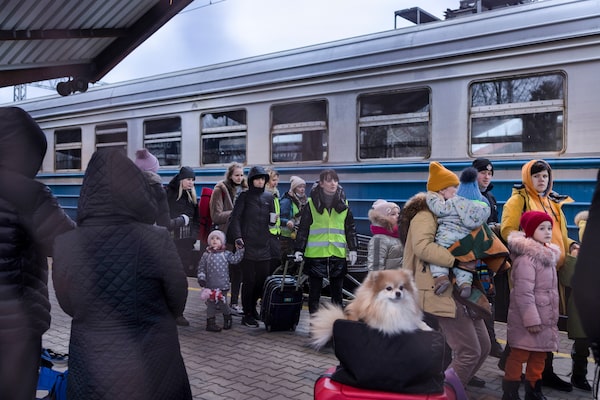
People who fled Ukraine arrive on the train from Kyiv at the train station in Przemysl, Poland, near the border with Ukraine, Wednesday, March 2, 2022.MACIEK NABRDALIK/The Globe and Mail
As more than a million Ukrainians flee the Russian invasion of their home country, resettlement agencies and associations in Canada are organizing donations, assisting with visa applications and compiling lists of available housing while they gear up for an influx of arrivals.
There are about 1.4 million people of Ukrainian descent living in Canada, one of the largest such populations outside of Ukraine. The community has decades of experience with resettling newcomers, and it has well-established networks for doing so. Agencies say they are being inundated with calls from people wanting to help.
“People are worried about their family and friends, and they are willing to bring, sponsor and help them somehow get out of the war zone” said Iryna Matsiuk, the Saskatoon-based co-chair of Ukraine Crisis Response Committee, part of the Ukrainian Canadian Congress Saskatchewan Provincial Council.
Already, the Ukrainian Canadian Congress – locally and nationally – has received offers of temporary and permanent housing for those expected to arrive. People have volunteered to buy groceries, donate clothing and furniture, become sponsors for refugees and provide immigration, interpretation and legal services for free, Ms. Matsiuk said. In Saskatoon, businesses in the farming and meat-packing sectors have reached out with offers of employment.
-Tavia Grant
11:46 p.m. ET
Russian cargo jet grounded at Toronto’s Pearson airport
An Antonov cargo plane that carried COVID-19 test kits to Canada has been grounded at Toronto’s Pearson Airport.
The plane, which is owned by a Russian company, has been grounded for most of this week after flight bans imposed by the West disrupted travel for some of the world’s most massive freighter jets.
Since Sunday, Europe, Canada and the United States have issued executive orders saying they are closing their airspace to planes controlled by Russia. The orders affect several Antonov An-124s, a cargo plane known for its unique carrying capabilities since it went into production in the 1980s-era Soviet Union.
Fewer than 60 Antonovs were ever made, and less than half are still in use. Distinctive for their expansive, nose-loading cargo bays, they can carry more than 150,000 kilograms.
Several Antonovs are controlled by the Volga-Dnepr Group, which is based in Ulyanovsk, Russia.
The Volga-Dnepr Antonov that landed in Toronto early on Sunday was ferrying supplies ordered by the Canadian government. “Public Services and Procurement Canada can confirm there were federally purchased rapid antigen tests on board,” departmental spokesperson Michele LaRose said.
It landed at 7 a.m. Later that morning, Transportation Minister Omar Alghabra announced Canadian skies were off-limits to Russia.
-Colin Freeze
